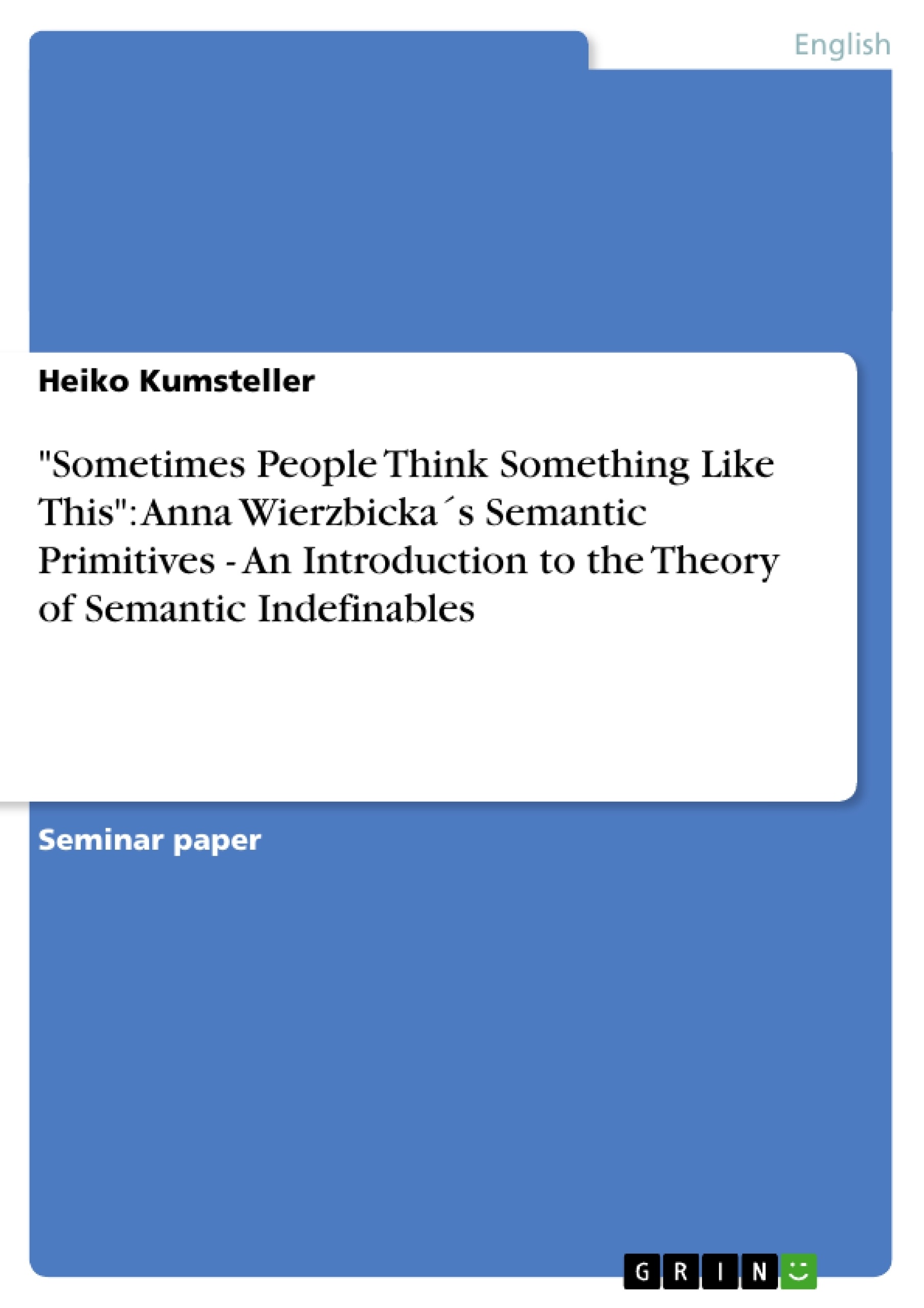For the past twenty something years, hardly a theory has caused as much uproar and
discussion in Semantics as Anna Wierzbickas theory of the Semantic Primitives. Her
theory, inspired by te works of Leibniz and other inquiries into the relation between
language and thought, and first set out in detail in 1972 in her work “Semantic Primitives”,
was among the first serious attempts to "establish" a semantic explanation for the
connection between the meaning of words in human language and human thought
processes: since humans use language as their only known tool to formulate thoughts, it
followed that the meaning of words in any given language could only be explained using
other words. Wierzbicka took up this idea but concluded that in this process of substitution,
that is, of explaining words with other words, it would be logical to try to explain complex
terms in ever less complex terms until, at some point, one would end up with a set of words
that could not, and needed not be, explained further, words that would yet suffice to explain
every other word in a language. Through experimenting, she devised such a set of words
and called these the "Semantic Primitives", in reference to their basic simplicity and
fundamental position in the relation of thought and language. Over the years, Wirzbicka
has constantly refined her theory, and updated the list of Semantic Primitives, and a ever
growing number of scholars of Semantics has begun to adopt Wierzbickas theory, making
it one of the more popular and widely accepted subcurrents in Semnatics.
In this paper, I will try to give a short comprehensive overview on the theory of the
Semantic Primitives, try to work out where the strengths and benefits of this theory lie, and
where it faces difficulties, and attempt to determine how, or whether, it can be applied for
the creation of a Semantic Dictionary.
Inhaltsverzeichnis (Table of Contents)
- Introduction:
- 1. "Sometimes someone thinks something like this" - the history of a theory
- A theory in Practice
- 2. “Thinking This, Someone Could Say Something Like This” – A Semantic Discussion: A Primitive Dictionary?
- 3. ”Thinking of This I Think Something Like This”
- 4. A few concluding words
- References.
Zielsetzung und Themenschwerpunkte (Objectives and Key Themes)
This paper aims to provide a comprehensive overview of Anna Wierzbicka's theory of Semantic Primitives. It examines the theory's historical development, its strengths and weaknesses, and its potential for creating a semantic dictionary. The paper explores how this theory compares to other approaches to semantics and its implications for understanding the relationship between language and thought.
- The history and development of the theory of Semantic Primitives
- The relationship between language and thought
- The role of semantic primitives in defining words and concepts
- The potential for creating a semantic dictionary based on Semantic Primitives
- The strengths and weaknesses of the theory in comparison to other semantic theories
Zusammenfassung der Kapitel (Chapter Summaries)
The first chapter explores the historical development of the theory of Semantic Primitives, tracing its roots back to the work of Leibniz. It discusses the theory's focus on natural language and its rejection of abstract symbols as a means of representing meaning. The chapter outlines the development of Wierzbicka's initial list of semantic primitives and its subsequent revisions.
The second chapter delves into a discussion on the use of Semantic Primitives in creating a semantic dictionary. It examines the possibilities and challenges of using these fundamental words to define all other words in a language. The chapter also considers the theory's potential applications in cross-cultural communication and translation.
The third chapter delves further into the theoretical underpinnings of Semantic Primitives, analyzing their role in capturing the nuances of meaning and the connection between thought and language. It explores the theory's implications for understanding the structure of human cognition and the nature of language itself.
Schlüsselwörter (Keywords)
The main keywords and focus topics of this paper are: Semantic Primitives, Anna Wierzbicka, semantics, language, thought, meaning, natural language, linguistic theory, semantic dictionary, mental lexicon, cross-cultural communication, translation.
- Quote paper
- Heiko Kumsteller (Author), 2003, "Sometimes People Think Something Like This": Anna Wierzbicka´s Semantic Primitives - An Introduction to the Theory of Semantic Indefinables, Munich, GRIN Verlag, https://www.grin.com/document/71987



